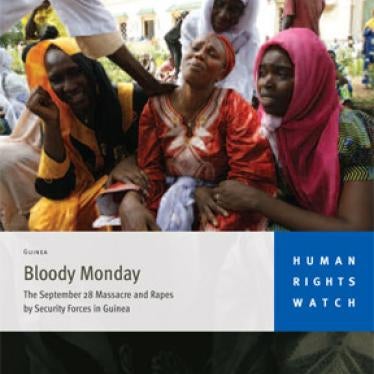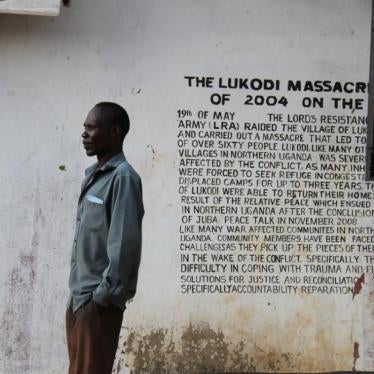(Dakar) - Guinea's new transitional government should take concrete steps to ensure redress for victims of the September 2009 massacre of more than 150 opposition supporters in a stadium in the capital, Conakry, Human Rights Watch said today in a letter to the new government. The government should also locate the bodies of those still missing and suspend officials implicated in the massacre and its aftermath, Human Rights Watch said.
Human Rights Watch called on the interim president, Brigadier General Sékouba Konaté, and transitional prime minister, Jean-Marie Doré, to take concerted action in accordance with international standards to prevent, investigate, and prosecute human rights violations committed by Guinea's security forces. In the period leading up to elections, planned for June, the government should monitor security forces to prevent attempts to intimidate or manipulate candidates or voters, Human Rights Watch said.
"Konaté and Doré have an opportunity to thwart Guinea's continued impunity and end the violence," said Corinne Dufka, senior West Africa researcher at Human Rights Watch. "Accounting for past abuses and building a society based on the rule of law is today's job, not tomorrow's."
On January 15, 2010, the country's 2008 coup leader, Captain Moussa Dadis Camara, stepped aside, opening the way for a largely civilian interim government, which was named on February 15 by Doré, a former opposition leader. Doré set a date for holding elections that would result in full civilian rule.
In its letter, Human Rights Watch urged the two leaders to draw a line in the sand from Guinea's abusive past and work to dismantle a system in which perpetrators of abuses have slept well, knowing they would never face investigation or prosecution, while the victims have been left to pick up the pieces of their lives.
No one has been held to account for violent crackdowns in 2006 and 2007 on Guineans demonstrating against deteriorating economic conditions, which left some 150 dead and more than 1,700 wounded. Other incidents that have gone unpunished include the premeditated attack against opposition supporters gathered in a stadium on September 28, 2009, in which 150 to 200 Guineans were killed; and rampant corruption and mismanagement of Guinea's vast natural resources, which has impeded Guineans' access to basic healthcare and education.
Human Rights Watch also expressed concern over the December 2009 promotion in rank and February 16 presidential decree reconfirming to high-level government posts two senior military officials who are, based on Human Rights Watch and United Nations investigations, heavily implicated in torture, killings, and rapes. Human Rights Watch called for the officers - Major Claude Pivi and Lieutenant-Colonel Moussa Tiégboro Camara - to be removed from their positions pending an impartial investigation into their roles in the September 2009 violence and other serious abuses.
Major Pivi was allegedly involved in the crackdown that followed the massacre at the stadium, including attacks on the homes of political leaders that evening. He has also been implicated in torture committed in 2008, including of Guinean police officers, criminal acts including theft, and the December 2009 killing of two soldiers allegedly associated with an assassination attempt on December 3 on the coup leader.
Lieutenant-Colonel Tiégboro personally commanded a unit of gendarmes that used deadly force against opposition supporters converging on the stadium and allegedly took an active part in the massacre, and, to a lesser degree, in the sexual violence that followed. Several men detained after the September massacre in an ad hoc detention center under his direct command were allegedly subjected to severe abuse. In June 2009 he publicly called on youth groups to mete out vigilante justice and "burn all armed bandits who are caught red-handed committing an armed robbery."
"The victims of September's violence have had to endure the continued presence on official duty of members of the Presidential Guard and others who took part in the bloodbath," Dufka said. "And even worse, many of the alleged perpetrators, including Pivi and Tiégboro, have been promoted and rewarded with government positions."
The International Criminal Court began an analysis of the situation in Guinea following the violence in September. One consideration in determining whether the court will open an investigation is whether the national courts are both willing and able to investigate and prosecute the crimes.
Given concerns over the judiciary's lack of independence from the executive branch, inadequate resources, and corruption, all available expertise should be used to ensure that domestic investigations and prosecutions are conducted fairly, impartially, independently, and effectively, Human Rights Watch said.
Human Rights Watch also called on Konaté and Doré to fund and make operational the National Observatory for Democracy and Human Rights (ONDH), a Guinean body mandated to investigate ongoing human rights abuses, and to make operational the Independent Commission of Inquiry on the January-February 2007 strike-related violence that left at least 137 dead.
In addition, authorities should guarantee the right to life and a fair trial for Lieutenant Abubakar "Toumba" Diakité, if he is taken into custody, Human Rights Watch said. Lieutenant Diakité is a key alleged perpetrator of the September violence who has been in hiding since the assassination attempt against Dadis Camara.
"Guinea's new leaders have important work ahead," Dufka said. "Their success should be measured by how well they address the past violence and restore the rule of law."







